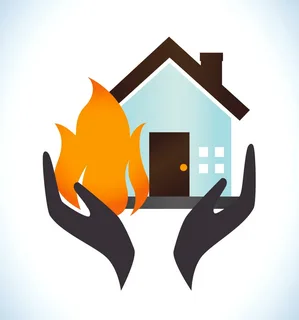Owning a home is a significant investment. However, unforeseen events like fires can have devastating consequences, causing significant property damage and financial hardship.
Home fire insurance is crucial for protecting your investment and afford financial security in the face of such disasters. It offers vital coverage for property damage, personal belongings, and potential living expenses, allowing you to rebuild and recover more easily after a fire.
Key Benefits Of Home Fire Insurance
Home fire insurance offers a range of valuable benefits that extend beyond simply covering property damage.
- Peace of Mind
Knowing your home and belongings are protected against fire damage provides significant peace of mind. It lessen the stress and anxiety associated with the potential for financial destroy in the event of a fire. With fire insurance, you can focus on recovery and rebuilding your life with greater ease.
- Legal and Liability Protection
Fire insurance can also provide some level of legal and liability protection. If a fire on your property causes damage to neighboring properties, your insurance policy may help cover the costs of those damages, protecting you from potential lawsuits.
Understanding Your Coverage
Standard fire insurance policies typically cover damage caused by fire, smoke, and related perils such as explosions. However, coverage can vary significantly between policies.
- Smoke Damage Coverage
This provides specific coverage for damage caused by smoke, soot, and odors resulting from a fire.
- Water Damage Coverage
This covers damage caused by water used to extinguish the fire, such as flooding or water damage to other parts of the house.
- Coverage for Specific Valuables
If you have beneficial items such as jewelry, antiques, or artwork, you may need to buy additional coverage to make sure they are adequately protected.
- Deductibles and Premiums
The deductible is the amount you’re accountable for paying out-of-pocket before your insurance scope kicks in. Higher deductibles generally result in lower premiums.
Tips For Choosing The Right Fire Insurance Policy
Finding the best fire insurance policy requires careful research and consideration.
- Compare Quotes
Obtain quotes from many insurance providers to compare premiums and coverage options.
- Review Policy Documents Carefully
Thoroughly review the policy documents to know the terms and conditions, including coverage limits, exclusions, and deductibles.
- Consider Your Individual Needs
Evaluate your specific needs and risk factors, such as the age and condition of your home, its location, and your personal belongings.
- Look for Discounts
Inquire about available discounts, such as discounts for home security systems, fire alarms, and non-smoking households.
The Importance Of Home Safety Measures
While fire insurance provides financial protection, taking proactive steps to prevent fires is crucial.
- Install and Maintain Smoke Alarms
Install smoke alarms on every level of your home and test them regularly.
- Develop and Practice an Escape Plan
Create a fire breakout plan for your household and practice it regularly.
- Regularly Inspect Electrical Appliances
Regularly inspect electrical appliances and cords for signs of wear and tear.
- Maintain Your Heating System
Have your heating system examine and serviced annually by a qualified professional.
By implementing these safety measures, you can significantly lessen the risk of fire and minimize possible damage to your home and belongings.
The Role Of Fire Safety In Home Protection
While fire insurance provides crucial financial protection in the event of a fire, proactive fire safety measures are equally important.
- Install and Maintain Smoke Alarms
Install smoke alarms on all level of your home, including inside bedrooms and outside sleeping areas. Test smoke alarms 1 monthly and replace batteries as needed.
- Develop and Practice an Escape Plan
Create a fire departure plan for your household and practice it regularly. Identify two escape routes from each room and designate a safe meeting place outside the home.
- Kitchen Safety
- Never leave cooking unattended.
- Keep children and pets away from the cooking area.
- Turn off the stove and oven when you leave the kitchen, even for a short time.
- Electrical Safety
- Regularly scrutinize electrical cords for signs of wear and tear.
- Unplug appliances when not in use.
- Avoid overloading electrical outlets.
- Heating Safety
- Have your heating system checked and serviced yearly by a qualified professional.
- Keep flammable matters away from heat sources, such as space heaters and fireplaces.
- Properly Dispose of Smoking Materials
- Always extinguish cigarettes and cigars completely before discarding them in a deep, sturdy ashtray.
- Never smoke in bed.
By implementing these fire safety measures, you can significantly lessen the risk of fire in your home and protect yourself and your family.
The Role Of Fire Extinguishers In Home Safety
While fire insurance provides financial protection after a fire, having a fire extinguisher readily available can help prevent a small fire from escalating into a major disaster.
- ABC Fire Extinguishers
These are multi-purpose extinguishers that can be used on most common types of fires, including fires involving ordinary combustibles (such as paper and wood), flammable liquids (such as gasoline and oil), and electrical equipment.
- Proper Placement
Keep a fire extinguisher in an easily attainable location in your kitchen and another on each level of your home.
- Knowing How to Use It
- Pull the pin.
- Aim the nozzle at the bottom of the fire.
- Squeeze the handle.
- Sweep the nozzle from side to side.
- Regular Inspection and Maintenance
- Regularly inspect your fire extinguishers to make suree they are in good working order.
- Have your fire extinguishers professionally inspected and recharged periodically.
By having a fire extinguisher readily available and knowing how to use it properly, you can increase your chances of effectively extinguishing small fires before they cause significant damage.
Conclusion
Home fire insurance is a crucial investment for every homeowner. By understanding the benefits of fire insurance and choosing the right policy for your needs, you can protect your most valuable asset and ensure your financial security in the event of a fire.
Take Action Today: Protect Your Home With Fire Insurance
Home fire insurance is an essential safeguard for every homeowner. It provides vital financial protection in the face of a devastating fire, ensuring you can rebuild and recover with greater peace of mind. For a starting point, you can explore AXA Thailand, a reputable insurance provider in Asia offering various insurance plans.
Frequently Asked Questions
- What are some common exclusions in home fire insurance policies?
While most standard fire insurance policies cover damage caused by fire, smoke, and related perils, they typically exclude damage from earthquakes, floods, acts of war, negligence, and gradual deterioration.
- How often should I review my home fire insurance policy?
It’s recommended to review your home fire insurance policy at least once a year, or whenever there are significant life events, home improvements, or market changes.
- How can I lower my home fire insurance premiums?
You can potentially lower your home fire insurance premiums by improving your home’s security, increasing your deductible, maintaining a good credit history, bundling your insurance policies, and shopping around for quotes from different insurers.
- What is the role of a fire extinguisher in home fire safety?
Fire extinguishers are essential tools for combating small fires. It’s recommended to use ABC fire extinguishers for home use, place them in easily accessible locations, learn how to use them correctly, and inspect and maintain them regularly.
- How can I reduce the risk of fire in my home?
To reduce the risk of fire in your home, install and maintain smoke alarms, develop and practice a fire escape plan, practice kitchen safety, be mindful of electrical safety, maintain your heating system, properly dispose of smoking materials, and be cautious with candles.





Be First to Comment